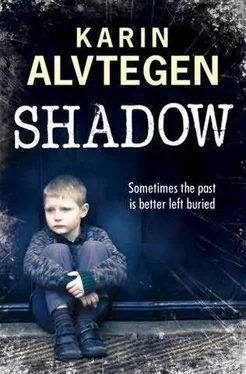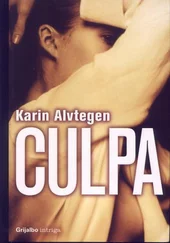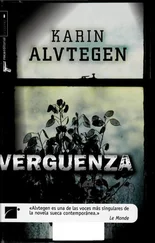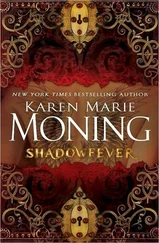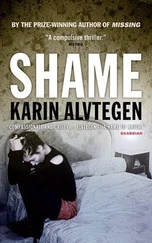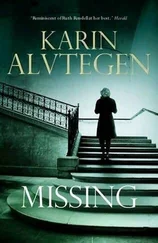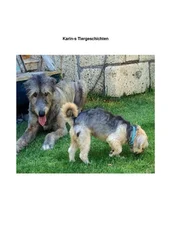‘I was eating breakfast in the kitchen when Gerda came and told me that Annika was still in bed. We thought she was already at school. I remember that it was past ten o’clock.’
Alice had left the kitchen and gone to her daughter’s room. Pulled up the blind with a snap and torn the bedcovers off the girl. She thought Annika was ruining everything, just when she finally felt a little joy for a change. She got a lump in her throat when she thought about it. The way she had scolded and scolded but got no reaction.
‘At first I thought it was just something to do with puberty, that she was just lying there out of sheer spite. Being difficult. But after a while I realised it was something else. She seemed closed off, as if she didn’t even hear what I was saying.’
The days that followed: the worry; the frustration. Axel said nothing, withdrew, as if he didn’t want to be involved in what was happening.
‘I tried to talk to her, I really did. I asked her if something had happened, but she didn’t say a word. She just lay there staring at the wall.’
Tears, so long bottled up, were spilling out along with the words. She remembered how she had tried and tried but finally lost patience. Gerda had cautiously suggested they should call the doctor, but Axel thought it was a family matter. And her vacillating between the desire to get help and the shame that their daughter was behaving like someone who was mentally ill.
Jan-Erik went over to the window, turning his back to her as if he wanted to be spared seeing her tears.
‘How long did she lie there like that?’
‘Four or five days. Gerda and I took turns looking in on her at night. Then one evening she suddenly began eating again, and naturally we took it as a sign that she was getting better.’
She needed a drink but knew that this was not the time. Jan-Erik seemed to have calmed down a bit, and she didn’t want to provoke his wrath. It had frightened her.
‘Afterwards I realised it was because she had made up her mind.’
‘Didn’t you ever talk to her friends? Did they not notice anything? What did they say at her school?’
Early on the lie had been formed. The fear that what had happened in the Ragnerfeldt home might cause a scandal had prevented them from asking any questions. The hit-and-run accident had been given as an explanation at her school as well, and it thus became the official truth.
‘They hadn’t noticed anything.’
Alice looked down at the cushion on her lap.
‘Where did she hang herself?’
She couldn’t stand it any longer. She got up and went to the kitchen. Blew her nose first on a piece of kitchen roll to create a diversion, and then quietly took the bottle out of the cupboard and unscrewed the top. When she turned round, Jan-Erik was standing in the doorway. Without a word he went over to the plate rack and got a glass. He took the bottle out of her hands and filled the glass to the brim, draining it in a single gulp and then setting it down on the worktop.
‘So, where did she hang herself?’
Maybe they should have got a divorce. One’s hand doesn’t linger on a hot-plate that sears the skin. But the soul was allowed to atrophy slowly without relief. Naturally she had considered it then, as a last desperate attempt to have some influence. But only briefly. One did not get divorced. It was as simple as that. Even if there was reason enough, there were other things that were more intimidating. She had few friends, and all contact with her parents and siblings had been broken off, so where could she turn? As Mrs Axel Ragnerfeldt she at least enjoyed a certain status.
All the sacrifices she had made to maintain the illusion.
If only she had understood how unhappy Annika was. If only she’d had the ability to look beyond her own pain, to see that there were others to consider. Perhaps then everything would have been different.
‘She hanged herself in Axel’s office.’
Jan-Erik collapsed on a kitchen chair and put his face in his hands. She filled the glass he’d set aside and brought it gratefully to her lips. She took a large mouthful and tried to defend herself against what her memory had set loose, everything that was now running amok. Jan-Erik sat motionless; only his shoulders moved in time with his breathing.
It was Axel who found her. Annika had carefully unscrewed the light fixture in the ceiling and stood on Axel’s desk. His scream woke her. On the way downstairs, fumbling to tie her dressing gown, Alice realised that the belt was missing. The sight of her daughter with the belt as a noose round her neck was eternally etched in her memory.
She filled the glass and knocked it back. No, that was enough of that. This was not something to dwell on. Thirty years had passed and nothing could be undone. Drowning herself in guilt would do no good. She had done the best she could under the circumstances.
She put the bottle back in the cupboard and went over to the sink to rinse out the glass.
‘Yes. That’s how it was, so now you know. The best thing for all of us is for this to remain within the family. It’s not something we should go round talking about.’
Jan-Erik’s shoulders stopped heaving. Slowly he straightened up. She wished she could escape the look that he gave her. Then he stood up, went into the living room and fetched the piece of paper. Without saying a word he went out the front door.
Alice looked at the clock. The TV programme she was waiting for would be starting soon. Why dig up old memories now? They were better off left alone.
She went back to the sofa and reached for the remote.
I t is by describing love that we rob fear of its power.
Kristoffer stood in front of one of the gravestones in Katarina cemetery and read the inscription. He’d had to get out of the flat. He was restless and needed to get hold of something to keep his fear at bay. He knew what his body was longing for.
The odd thing about alcohol was that it could be used for so many purposes: to forget, to intensify a mood, to relax. To celebrate, go to sleep, be content, warm up, cool off, escape, find inspiration.
To summon courage.
Of all the drugs he had used, alcohol was the one he found most deceptive. Insinuated into and accepted in every environment, always available, enthusiastically promoted by the state and establishment. He was well aware of the discomfort he caused each time he said ‘No, thank you.’ The status these words conferred. People didn’t want to have sober witnesses when they let go of their inhibitions; a guilty conscience sitting next to them, looking on.
He had read something once that stuck in his mind. He recalled the lines pretty much word for word, since he thought he’d found an explanation and maybe an excuse for his own earlier behaviour: Since the human being as a species is extremely vulnerable, he must always be ready to defend himself. The human brain has increased in size during evolution. Consciousness is a refined defence system – a constant state of alertness that watches the surroundings to discover possible threats. Our strong sense of fear explains much about human nature and civilisation.
Sometimes he thought this fear might be the explanation why alcohol was so tempting. To be able to shut down the warning system for a while and relax. To numb one’s brilliant consciousness. In all cultures intoxicants are used; only the types are different. If one discovered an isolated tribe in a remote jungle, there were bound to be certain leaves or roots that could be chewed or smoked to achieve the desired intoxication. In the Western world alcohol had been chosen as the legitimate drug.
Sometimes he thought that evolution had made a mistake in developing such an advanced brain. Why else would so many people feel the need to numb it? Yet we see ourselves as being the crown of creation with a superior intellect and the ability to show empathy and moralise. Perhaps humanity was at a critical stage: intelligence had made it possible to eradicate the planet, while deep inside everyone was governed by powerful fears and primitive desires; an immense ongoing conflict hidden inside everyone.
Читать дальше
